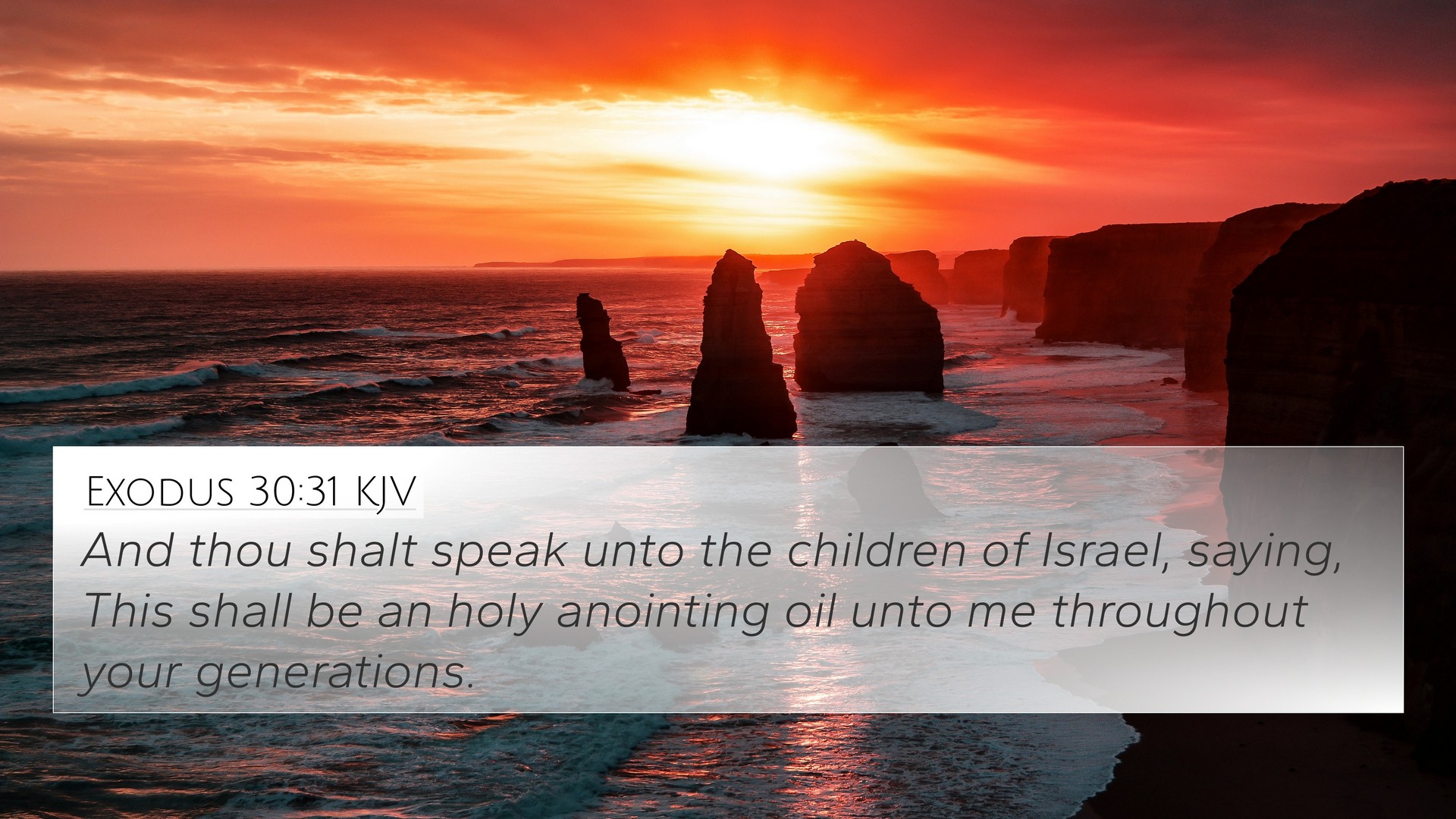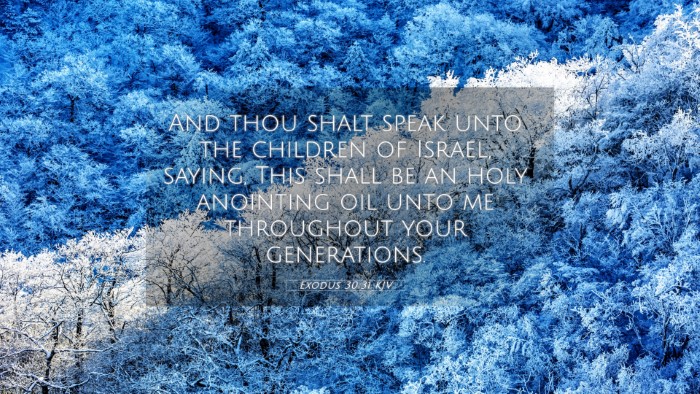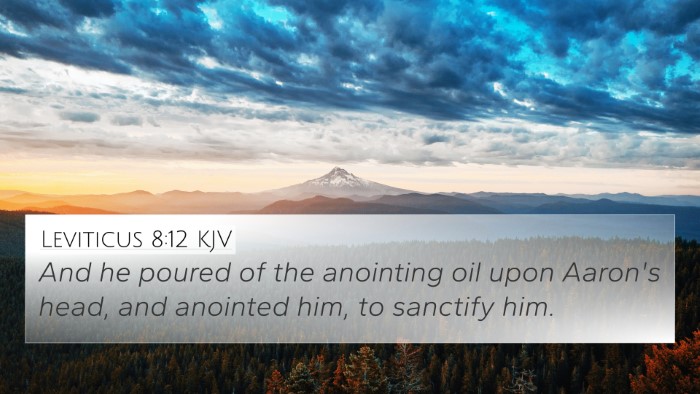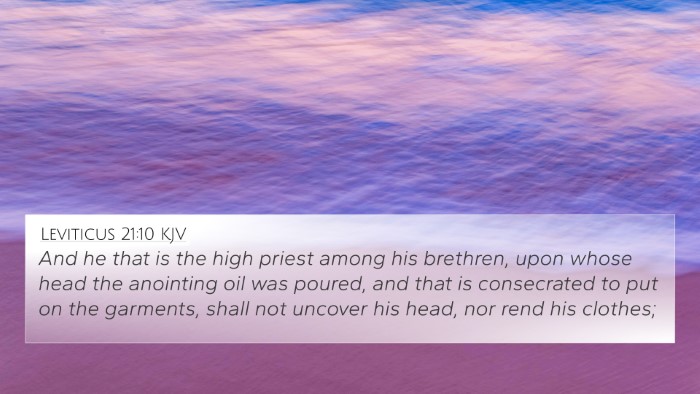Understanding Exodus 30:31
Exodus 30:31 states: "And thou shalt speak unto the children of Israel, saying, This shall be an holy anointing oil unto me throughout your generations." This verse serves as a directive from God to Moses regarding the preparation and usage of holy anointing oil for the priests. The significance of this instruction is profound, reflecting themes of holiness, consecration, and divine selection.
Commentary Insights
-
Matthew Henry's Commentary:
Matthew Henry emphasizes the importance of the anointing oil as a symbol of the Holy Spirit's presence and power in consecrating the priests for their sacred duties. He points out that the oil is not merely a physical substance but rather represents the divine authority bestowed upon the priests. It highlights that the act of anointing is a sign of setting apart for God’s service. Henry also draws connections to how this practice foreshadows the anointing of Christ, who fulfills the ultimate role of the High Priest.
-
Albert Barnes' Notes:
Albert Barnes explains the characteristics and composition of the anointing oil as specified in earlier verses of Exodus 30. He details how the unique formula signifies its sacred nature, enhancing its role in sacred rituals. Barnes notes that the instruction for the oil to be made "throughout your generations" indicates its perpetual relevance in maintaining the holiness of the priestly lineage. He correlates this command with the idea that holy practices are to be continuous, preserving the traditions established by God.
-
Adam Clarke's Commentary:
Adam Clarke elaborates on the phrase “unto me throughout your generations,” discussing the implications of generational holiness. He interprets this as an ongoing mandate for the Israelites to respect and maintain the sanctity of the anointing oil. Clarke also addresses the types of oils and fragrances used, noting their value and purpose in worship. He draws parallels between this anointing and the spiritual anointing believers receive today, serving as a connection point between the Old and New Testaments.
Bible Verse Cross-References
This verse is connected to several other scriptures that underline similar themes of anointing, holiness, and consecration. Notable cross-references include:
- Exodus 29:7: Discusses the ceremonial anointing of Aaron as a priest, highlighting the importance of sacred anointing in establishing priestly roles.
- 1 Samuel 10:1: The anointing of Saul signifies God's choice for kingship, drawing a parallel between the anointing of leaders and priests.
- Psalm 133:2: Compares the preciousness of anointing oil with the unity among brethren, illustrating its symbolic nature of blessing.
- Isaiah 61:1: Proclaims the anointing of the Messiah to preach good tidings, identifying Jesus as the ultimate fulfillment of anointed roles.
- 2 Corinthians 1:21-22: Mentions that God has anointed believers, emphasizing the enduring relevance of anointing in the New Testament context.
- James 5:14: Refers to anointing the sick with oil as a practice in the early church, linking back to the biblical mandate of sacred anointing.
- Hebrews 9:18-23: Discusses the importance of blood and anointing in the context of the Old Covenant, establishing a typological relationship with Christ's sacrifice.
Thematic Connections
Exodus 30:31 serves as a crucial theme within the broader narrative of the Bible, connecting to various doctrinal understandings:
-
Holiness:
The anointing oil symbolizes God's holiness and His desire for His people to live set apart for Him.
-
Divine Selection:
This verse illustrates God's choice and consecration of leaders, whether priests or kings, demonstrating His sovereignty in appointing individuals for sacred tasks.
-
Perpetuity of Worship:
The command “throughout your generations” emphasizes the continuous nature of worship and the importance of maintaining traditions that honor God.
-
Symbolism of Oil:
Oil represents not only physical anointing but also spiritual empowerment, embodying the work of the Holy Spirit.
Application and Reflection
Understanding Exodus 30:31 invites believers to reflect on the significance of consecration in their lives:
-
Personal Anointing:
Reflect on how the concept of being set apart for God can influence personal faith and daily living.
-
Community Worship:
Consider the importance of communal practices that honor God, drawing from the foundations laid in the Old Testament.
-
Spiritual Legacy:
Engage in conversations about faith across generations, acknowledging the continuity of God’s call to holiness.






